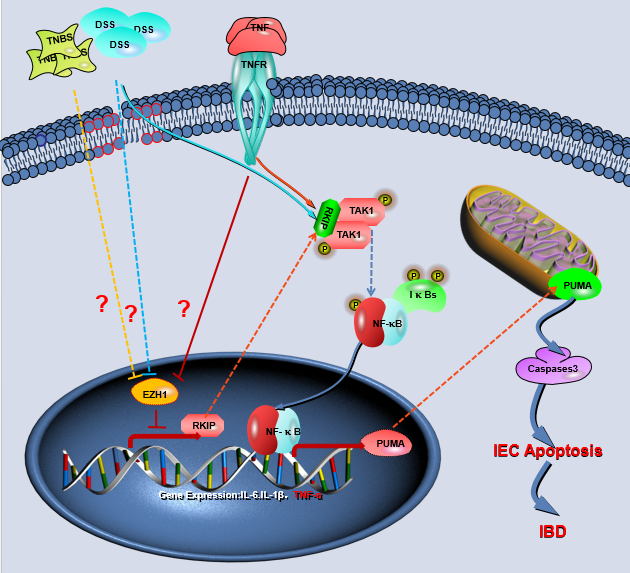Prof. WANG Xiaojian group from institution of immunology, the School of Medical Sciences discovered a new mechanism involved in colitis development. This study is recently published online at Gut.
Raf kinase inhibitor protein (RKIP) appears to control cancer cell metastasis and its expression in colonic tissue is related to colonic cancer development. However, its function in maintaining homeostasis of gastrointestinal tract has not been studied. The team leaded by xiaojian Wang demonstrate the RKIP expression is positively correlated with the severity of (IBD). RKIP deficiency protects mice from dextran sulfate sodium (DSS) - or 2, 4, 6-trinitrobenzenesulfonic acid (TNBS)-induced colitis and accelerated recovery from colitis. RKIP deficiency inhibits DSS- or TNBS-induced infiltration of acute-phase immune cells and reduces production of proinflammatory cytokines and chemokines in colon. RKIP deficiency inhibits DSS- or TNBS-induced colonic epithelial barrier damage and intestinal epithelial cell (IEC) apoptosis.. Mechanistically, RKIP enhances the induction of P53-upregulated modulator of apoptosis (PUMA) by interacting with TGF-β-activated kinase 1(TAK1) and promoting TAK1-mediated NF-κB activation. This is supported by the observation that TAK1 activation is positively correlated with the expression of RKIP in human clinical samples and the development of IBD. Taken together, RKIP contributes to colitis development by promoting inflammation and mediating IEC apoptosis, representing a predictive marker and therapeutic target of IBD.
Dr. LIN Wenlong is the first author of this paper. This study was supported by grants from the Major State Basic Research Program of China and the National Natural Science Foundation of China.

Mechanism schematic diagram of RKIP regulating IBD